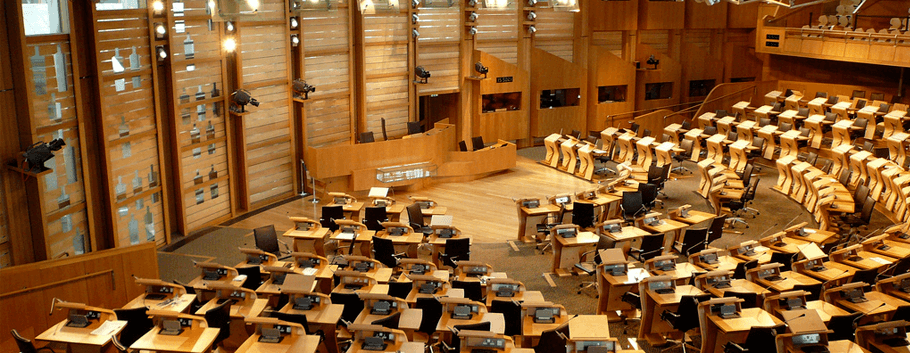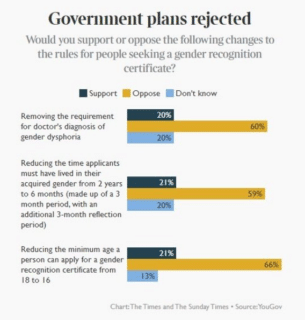Holyrood’s ‘sex swap’ vote shows contempt for public

Just before Christmas, the Scottish Parliament voted through its controversial Gender Recognition Reform Bill by a significant majority. It aims to: enable people to change legal sex simply by signing a declaration; reduce the existing waiting period from two years to six months or less; and remove the requirement for those wishing to transition to have a medical diagnosis of gender dysphoria.
This includes allowing even convicted sex offenders to legally change sex – the only additional obstacle for them to overcome being a risk assessment. And if it were not enough that adults are able to make the enormous decision to change their legal sex without any evidence or medical scrutiny, the law in Scotland will also be extended to allow those aged just 16 to do so too.
Back in September 2018, Nicola Sturgeon wrote a column for the Glasgow Times celebrating Scotland as “a world-leader on progressive policy making”. A month later in her keynote speech at the SNP’s party conference, she called Scotland “a beacon for progressive values”, which she listed as “equality, opportunity, diversity and fairness”.
But her commitments to ‘progress’ and ‘equality’ ring hollow when the majority of the adult population of Scotland go ignored.
Not listening
Public opinion was firmly against Sturgeon and the SNP/Green alliance. Nearly two-thirds of Scottish adults said they opposed each aspect of the plans. Women’s rights campaigners in particular were incensed by the proposals, which they said put women and girls at risk from unscrupulous men who would abuse the law to gain access to female-only spaces. The plans threatened the privacy and safety of half of the population of Scotland.
Campaign groups were set up by concerned women specifically in response to these ill-thought-through proposals. For Women Scotland and Women and Girls in Scotland both did their utmost to bring the problems to the public’s attention. They were joined in protesting against the Bill by groups based outside Scotland, including Sex Matters and Fair Play for Women. Their appeals to common sense garnered support from the public and the media, as well as high-profile politicians and famous faces – most notably JK Rowling. For many, the Harry Potter author remains Scotland’s darling, but she has been ostracised by the woke, ‘progressive’ sections of society.the majority of Scotland’s elected representatives had their fingers firmly stuffed in their ears
The campaigns culminated with a sustained peaceful protest outside Holyrood while the Bill was being debated. Representatives from those groups, as well as unaffiliated members of the public, took to the streets to make their voices heard; to let the Scottish Parliament know exactly what they thought of the Bill.
But the majority of Scotland’s elected representatives had their fingers firmly stuffed in their ears, roundly refusing to hear the electorate.
Revolt
The SNP/Green alliance whipped its MSPs to vote in favour of the Bill, rather than allowing a free vote on a controversial issue. But this did not stop seven voting against their party and two abstaining at the first stage; Communities Minister Ash Regan the most high profile dissenter.
Since ministers cannot vote against the Government without being sacked, Regan resigned preemptively, and later said her conscience “would not allow me to vote for a Bill where I could not be 100 per cent certain that women and girls would not be in danger”.
She added: “And many people have written to me over the last few days, and women across Scotland, many many women across Scotland, have deep concerns about this and I believe that their voices deserve to be heard.” They weren’t.
By the final vote, the number of SNP dissenters had crept up to nine – its largest rebellion in 15 years in power – but still not nearly enough to prevent the Bill from passing.
Westminster veto
As we roll into the second half of January, the Westminster Government has taken the unprecedented step of vetoing a Bill which it says “would have an adverse impact on the operation of Great Britain-wide equalities legislation”. Scotland Secretary Alister Jack MP invited the Scottish Parliament to introduce a new Bill that would be deemed ‘compatible’ with wider equalities law whilst still particularly highlighting his Government’s opposition to allowing those as young as 16 to change their legal sex. In response, Nicola Sturgeon accused Westminster of launching “a full-frontal attack” on Holyrood and said the Scottish Government would “defend the legislation”.
It would be no surprise to see the legislation eventually being argued over in the Supreme Court. But these will be arguments over the extent of the Scottish Parliament’s power within the bounds of devolution. It will not be a critique of the dangers of a Bill that endangers women and girls, and encourages a generation of youngsters to surge headlong into a lifetime of challenges they cannot possibly comprehend.
Nicola Sturgeon may truly believe in the rightness of her ‘progressive’ cause, but this does not absolve her of the responsibility to listen to the people she has been elected to represent. Scotland does not want this law, and its First Minister would do well to hear that.

